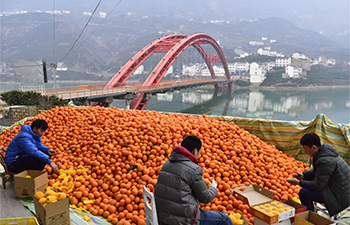
Wang Chunying (R), spokesperson of the State Administration of Foreign Exchange (SAFE), speaks at a press conference in Beijing, capital of China, Jan. 18, 2018. According to the SAFE, China saw more balanced cross-border capital flow in 2017 as willingness to purchase the greenback waned thanks to rising confidence in the Chinese yuan and the domestic economy. (Xinhua/Shen Hong)
BEIJING, Jan. 18 (Xinhua) -- China saw more balanced cross-border capital flow in 2017 as willingness to purchase the greenback waned thanks to rising confidence in the Chinese yuan and the domestic economy.
Chinese banks' net forex settlement deficit fell significantly last year, according to the State Administration of Foreign Exchange (SAFE).
Commercial banks bought 1.6441 trillion U.S. dollars' worth of foreign currency, up 14 percent year on year, while selling 1.7557 trillion U.S. dollars, down 1 percent compared with 2016. This resulted in a net forex settlement deficit of 111.6 billion U.S. dollars, down by a whopping 67 percent year on year.
The top forex regulator pointed out that the forex market has seen more balanced demand and supply, with the fourth quarter of last year reporting a settlement surplus of 1.2 billion U.S. dollars.
An index weighing bank clients' willingness to purchase forex fell 9 percent year on year, while individual cross-border remittances and deposits also shrank significantly compared with 2016.
"The year 2017 marked the threshold when China's cross-border capital flow transited from net outflow to general balance," said SAFE spokesperson Wang Chunying.
China's forex reserves ended the downward trajectory of the previous two years to gain 129.4 billion U.S. dollars in 2017, while its current account surplus remained in a reasonable range and the financial account saw net capital inflow in the first three quarters of last year.
Wang attributed the more balanced forex supply and demand to steady domestic economic expansion, acceleration of the financial sector's opening as well as a recovering global economy.
Cross-border capital flow will continue to remain generally stable as China's emphasis on high-quality growth will boost market confidence and more opening-up efforts will attract more capital inflow, according to Wang.















